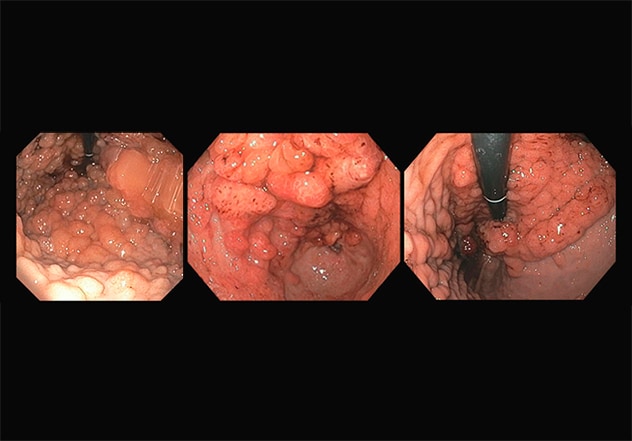Jan. 08, 2025
 Endoscopic images of innumerable polyps within the stomach
Endoscopic images of innumerable polyps within the stomach
Familial adenomatous polyposis increases an individual's risk of colorectal cancer and other conditions, including gastric polyposis, which is depicted in these images.
Familial adenomatous polyposis (FAP) is a rare, autosomal dominant, inherited condition caused by a germline mutation that results in the development of hundreds of colorectal adenomas. FAP increases an individual's risk of colorectal cancer (CRC) and other conditions, including gastric polyposis.
Prophylactic total proctocolectomy has greatly reduced the risk of CRC in individuals and families with FAP. Although gastric polyposis commonly occurs in people with FAP, there is a lack of consensus about the incidence of gastric cancer in these patients. Additionally, there are no universally accepted guidelines outlining how and when to conduct screening and surveillance and which risk factors, if any, warrant prophylactic total gastrectomy to reduce the risk of progression to gastric cancer.
These questions prompted a team of Mayo Clinic researchers to conduct a retrospective review of a large population of people with FAP to evaluate the incidence of gastric cancers and associated risk factors. The results of this study were published in the Journal of Gastrointestinal Surgery in 2024.
Methods
The researchers identified a total of 337 patients who underwent 2,502 upper endoscopies at Mayo Clinic, with a median of 10.4 years of endoscopic surveillance. The researchers calculated the cumulative incidence of gastric cancer using Kaplan-Meier survival approaches. And they examined clinical characteristics associated with the development of gastric cancer using Cox proportional hazards regression.
Results
According to Travis E. Grotz, M.D., and co-authors, the study yielded some important data related to gastric cancers in patients with FAP. Dr. Grotz is a surgical oncologist and researcher at Mayo Clinic in Rochester, Minnesota, who served as the publication's corresponding author.
"Our study found that the overall risk of stomach cancer in FAP is low and that despite extensive polyposis of the stomach, endoscopic surveillance and sampling can identify the few patients at risk for subsequent development of stomach cancer," explains Dr. Grotz. "In these few patients, prophylactic surgeries can be considered to reduce this risk."
Study findings shared in the journal publication include the following:
- The 337 patients who underwent endoscopies at some time during surveillance included 294 patients (87%) with gastric polyps, 200 (59%) with fundic gland polyps, 116 (34%) with low-grade dysplasia (LGD), and 11 (3.3%) with high-grade dysplasia (HGD).
- Of the 294 patients with gastric polyps, six patients (2%) developed gastric cancer, which included five patients with HGD. The six patients diagnosed with gastric cancer included three patients with polyps detected during previous endoscopy, two patients with polyps detected at the time of cancer diagnosis and one patient with LGD detected during previous endoscopy.
- The 10-year cumulative incidence of gastric cancer in all 337 study participants was 0% among patients with no polyps, 1% among patients with polyps, 6% among patients with LGD, 11% among patients with polyps ≥ 2 cm and 20% among patients with HGD. Both HGD and polyps ≥ 2 cm had a strong association with the development of gastric cancer (P < 0.001).
Even though the overall risk of gastric cancer in these patients appears low, the researchers note that outcomes associated with these cancers remain poor.
"We are hopeful that these findings will encourage the development of gastric cancer surveillance guidelines specific to patients with FAP that could help improve detection rates, guide timely intervention, and ultimately improve survival rates and quality of life in this high-risk patient population," explains Lisa A. Boardman, M.D., a gastroenterologist and researcher at Mayo Clinic in Rochester, Minnesota, and a co-author on the study publication.
Dr. Grotz adds that implementing these endoscopic surveillance strategies and expanding this analysis to other secondary cancers such as pancreatic and duodenal cancers would be appropriate next steps.
For more information
Christenson RV, et al. Gastric polyposis and risk of gastric cancer in patients with familial adenomatous polyposis. Journal of Gastrointestinal Surgery. 2024;28:1890.
Refer a patient to Mayo Clinic.